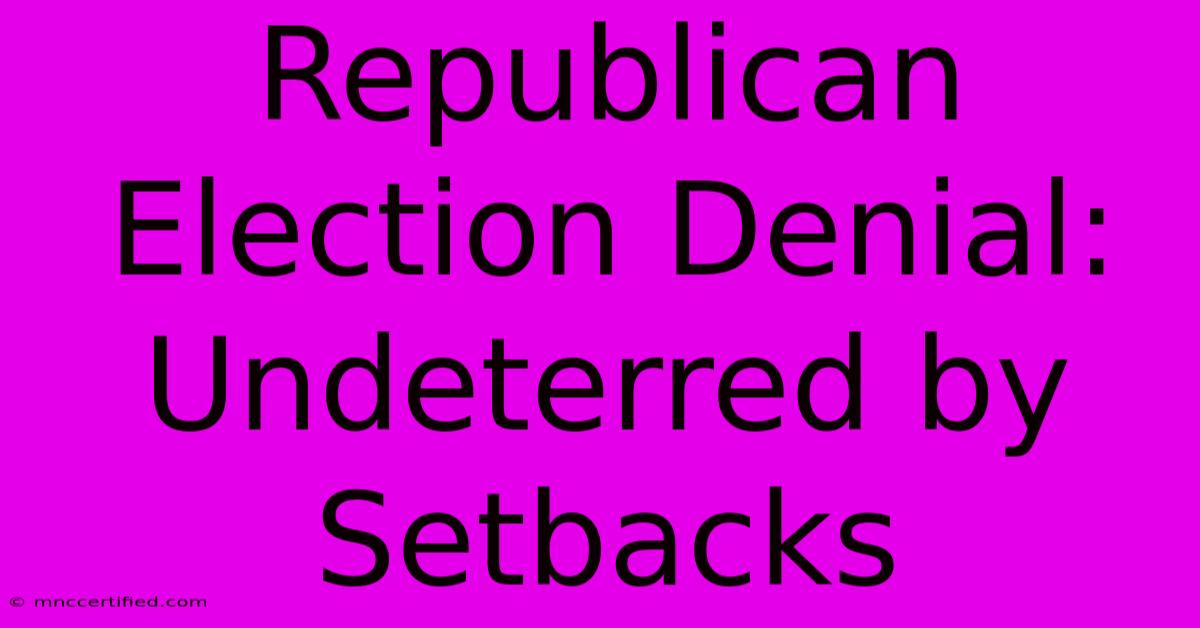Republican Election Denial: Undeterred By Setbacks

Table of Contents
Republican Election Denial: Undeterred by Setbacks
The 2020 US presidential election, despite its clear outcome, continues to be a point of contention for a significant segment of the Republican Party. Fueled by unfounded claims of widespread voter fraud, a large portion of the party base, and even some elected officials, have embraced election denial, a stance that undermines faith in democratic processes and fuels political polarization. Despite numerous legal challenges and investigations failing to substantiate these claims, the movement persists, raising concerns about the future of American democracy.
Persistent Claims and Their Impact
The allegations of widespread voter fraud, primarily focused on the battleground states of Georgia, Pennsylvania, and Arizona, were repeatedly debunked by courts, election officials, and independent fact-checkers. Yet, the narrative persists, fueled by social media platforms and amplified by prominent figures within the Republican Party. This persistent narrative has had several consequential effects:
- Erosion of Public Trust: The constant dissemination of unsubstantiated claims erodes public trust in election integrity and the democratic process itself. This can lead to cynicism and disengagement among voters, potentially impacting future elections.
- Heightened Political Polarization: The focus on election denial further divides the country along partisan lines, creating an environment of mistrust and hostility. This polarization makes it difficult to find common ground and address crucial national issues.
- Threats to Democratic Institutions: The repeated attempts to overturn election results based on unproven claims pose a direct threat to the foundation of American democracy. Such actions undermine the rule of law and threaten the peaceful transfer of power.
The Role of Key Figures
Several prominent figures within the Republican Party have played a significant role in perpetuating the election denial narrative. Former President Donald Trump, who continues to maintain that the election was stolen, remains a powerful influence within the party, and his rhetoric has resonated with a large segment of his base. Other influential Republicans, including several members of Congress, have echoed Trump's claims, further amplifying the narrative.
Moving Forward: Addressing the Challenge
The continued prevalence of election denial poses a significant challenge to the future of American democracy. Addressing this issue requires a multifaceted approach:
- Promoting Media Literacy: Encouraging critical thinking and media literacy skills can help people discern fact from fiction, particularly when navigating online information.
- Strengthening Electoral Systems: Implementing measures to enhance election security and transparency can address concerns about potential vulnerabilities while reassuring voters of the system's integrity.
- Promoting Bipartisan Dialogue: Fostering open and respectful dialogue between opposing viewpoints is crucial to bridge the partisan divide and foster a shared understanding of the democratic process.
- Holding Leaders Accountable: Leaders who promote unsubstantiated claims and undermine democratic institutions must be held accountable for their actions.
Conclusion
The ongoing wave of election denial within the Republican Party presents a serious threat to American democracy. Its persistent claims, despite lacking evidence, continue to sow seeds of doubt and mistrust in the electoral process, contributing to political polarization and weakening faith in democratic institutions. Addressing this challenge requires a collective effort to promote media literacy, strengthen electoral systems, foster bipartisan dialogue, and hold leaders accountable for their actions.
Keywords: Republican Party, Election Denial, Voter Fraud, 2020 Election, Donald Trump, Democracy, Polarization, Media Literacy, Electoral Integrity, Bipartisan Dialogue, Accountability.

Thank you for visiting our website wich cover about Republican Election Denial: Undeterred By Setbacks . We hope the information provided has been useful to you. Feel free to contact us if you have any questions or need further assistance. See you next time and dont miss to bookmark.
Featured Posts
-
Bitcoin Price Response To Events During The Recent Recession
Nov 07, 2024
-
Should I Clean My Car Before Trading It In
Nov 07, 2024
-
Varicose Vein Removal Covered By Insurance
Nov 07, 2024
-
Millwall Vs Leeds Boss Sees X Factor In Whites
Nov 07, 2024
-
Trump Win Ukraines Cautious Celebration
Nov 07, 2024